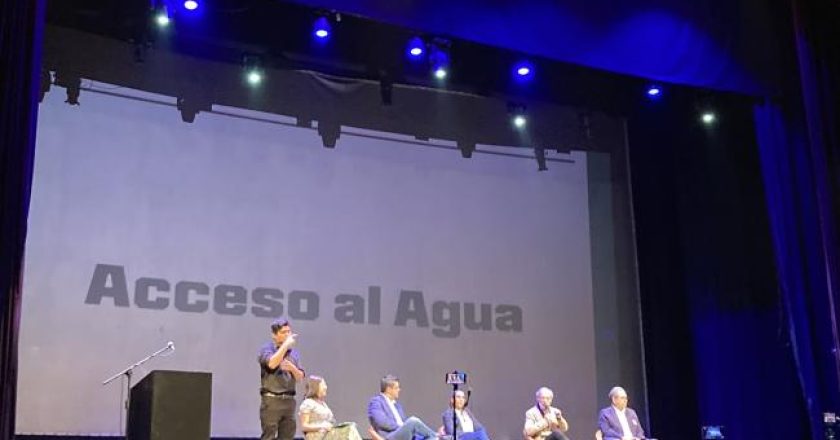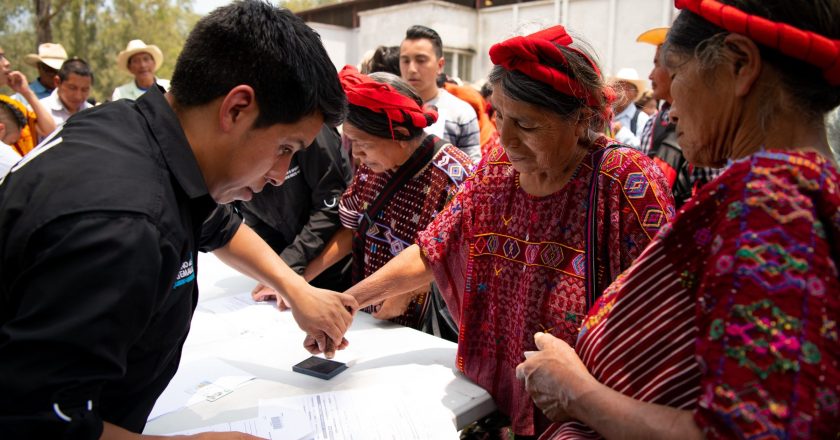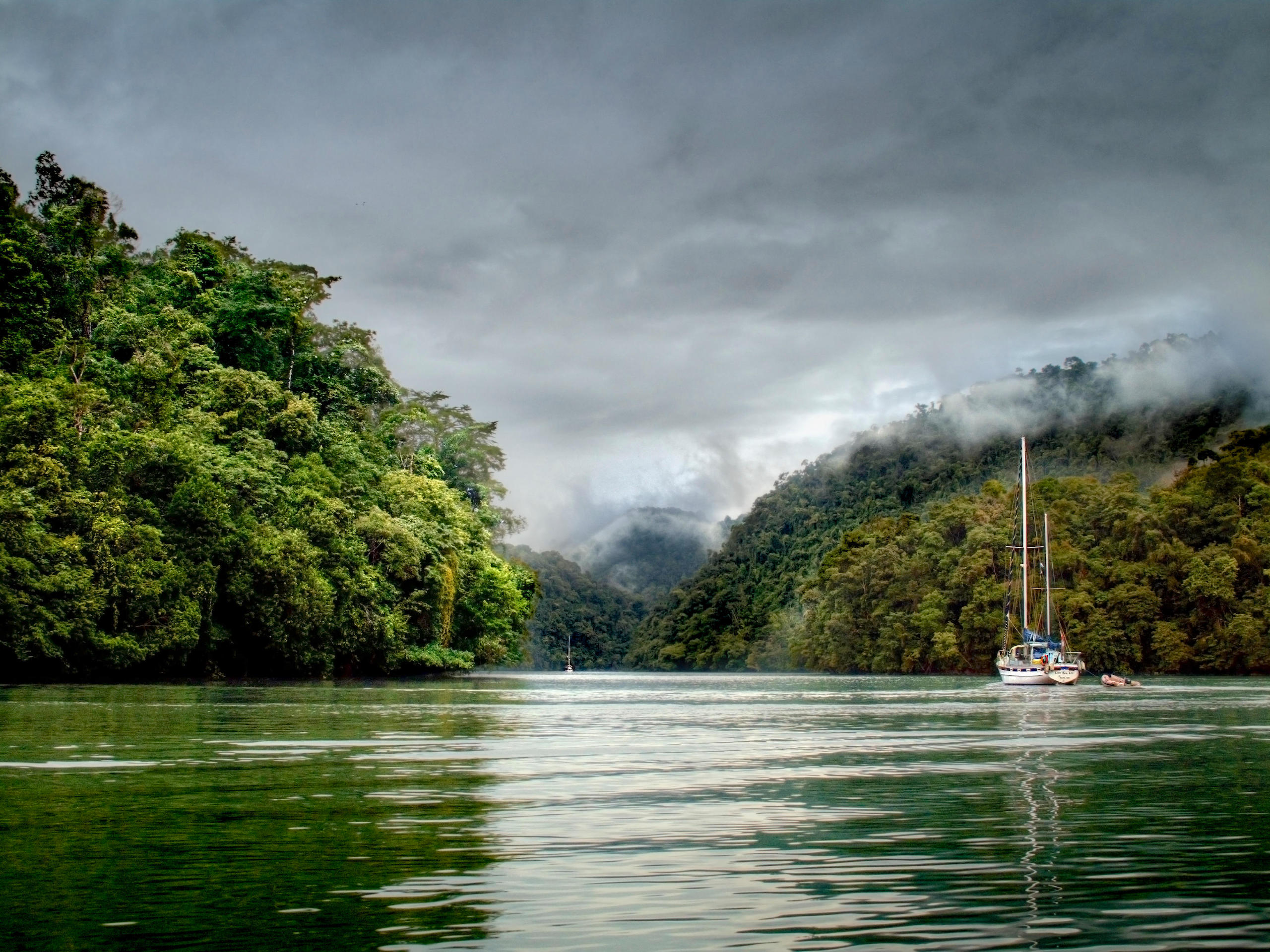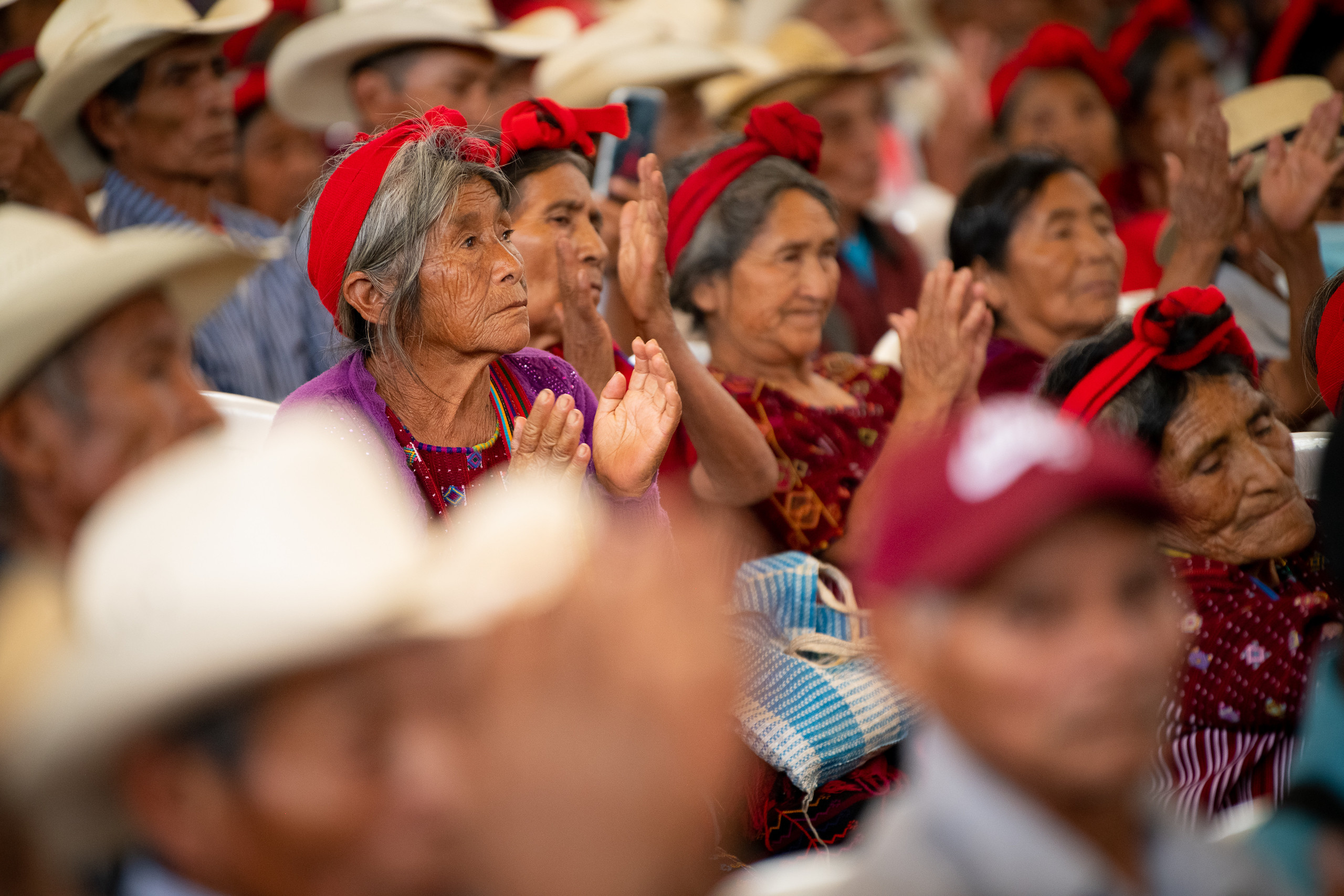Amid cheers, Ninotchka Matute Rodríguez walked onstage in a packed theater at a recent mayoral debate in Guatemala City’s political and cultural city center. On May 25, exactly one month before Guatemala’s general elections, Matute’s presence at the debate dubbed Jóvenes Deciden (Youth Decide) solidified the possibility of her election as Guatemala City’s next and first female mayor. Her flare jeans and black blazer conveyed a casual yet professional demeanor.
With members of her party, Matute walked seven blocks to the event down the Sexta Avenida, the main pedestrian street that connects locals to and from public transportation, the national plaza, and several public parks and cultural centers in the capital’s historic neighborhood. Student and youth organizations, striking workers, and Indigenous and campesino coalitions strategically occupy the avenue for public and political engagement and protest. Matute’s own presence on the avenida is no different.
An architect and urban planner, Matute emerged in the mayoral race shortly after the criminalization of lawyer and municipal candidate Juan Francisco Solórzano Foppa disqualified him from the race. Foppa and Matute are associated with Movimiento Semilla, a social democratic party whose primarily ladino, urban constituency foregrounds equality, a “humane economy,” and the promotion of civic participation as their principal concerns. Foppa briefly defended José Rubén Zamora Marroquín, president of the recently shuttered newspaper elPeriódico. Zamora was arrested in July 2022 on charges of money laundering, an allegation he says was manipulated to silence investigations into government corruption. In recent months, violence has increased against journalists documenting crimes committed by the state. The charges against Zamora—which led to the newspaper’s closure—represent the increasing power of an authoritarian network of political elites colloquially known as “el pacto de corruptos” (the pact of the corrupt).
In March 2023, Foppa resigned as Zamora’s lawyer amid concerns about his own criminalization as a result of advocating for Zamora’s release. Nevertheless, Foppa was arrested in April on charges of obstruction of justice shortly after announcing his campaign for mayor of Guatemala City. Matute became the party’s chosen substitute on a platform that centers water equity and infrastructure. Now, her candidacy and the movement she represents could rupture the sleeping powers of municipal politics and the urban status quo in Guatemala City.
A New Left Coalition Centers Equity and Urban Planning
Matute’s candidacy is backed by FoppaXLaCiudad, a left-leaning coalition bringing together the political parties Movimiento Semilla, Winaq, and Guatemalan National Revolutionary Unity (URNG-MAIZ). The union of these three parties signals landmark alignment between Guatemala’s divided left. Movimiento Semilla represents an institutionalized approach to social democracy and justice, while Winaq and URNG-MAIZ are rooted in Guatemala’s revolutionary history with majority Indigenous and campesino followings, organizing primarily around campaigns for territorial sovereignty and political self-determination. Winaq was founded by Maya K’iche human rights activist and Nobel Peace Prize winner Rigoberta Menchú, and URNG-MAIZ is a political union between several clandestine guerrilla movements from the 1980s that became a legal political party after the state’s return to democracy in 1996.
FoppaXLaCiudad’s increasing popularity stems from its focus on plural democracy formed around el bien común, or the common good.
FoppaXLaCiudad’s increasing popularity stems from its focus on plural democracy formed around el bien común, or the common good. This contrasts sharply with the unpopular reign of Álvaro Arzú, whose five terms as Guatemala City’s mayor—first in 1986 and then for four consecutive terms from 2004 until his death in 2018—contributed to urban blight and segregation, the pocketing of his family’s wealth in shadow contracts, and the enforced privatization of essential resources, including the municipal water company EMPAGUA. Arzú presided over Guatemala’s Peace Accords as president in 1996 and his family maintains a multilateral and multigenerational influence over government decision making.
At the May 25 debate, applause for Matute’s responses drowned out her opponents’ answers. Housing, public security, civic participation, and water infrastructure are four of 10 focal points in FoppaXLaCiudad’s proposal, one of the only platforms that explicitly addresses structural inequality and neoliberal paradigms like the privatization of public goods and services as the drivers behind the capital’s collapsing social infrastructure. Matute’s expertise in architecture, public planning, and urban conservation were crucial in informing her answers to the three debate themes of the evening: water, transportation, and public space.
Matute also spoke to her personal experiences as a woman living in the city. “We have the certain possibility of working on a city that has been historically designed by and for men, and to design it from the perspective of women, who are the users that move the most in the city,” she said. “Let us not miss the opportunity, it is time to lose the fear to change and challenge the system.”
Notably absent from the debate was current mayor Ricardo Quiñónez Lemus, who assumed the position after Arzú’s death and was reelected in 2019. Other candidates—like Carlos Sandoval, from the party Todos, and a representative from Podemos who attended on behalf of Sebastián Arzú, the grandson of Álvaro Arzú—leaned on statistics and their previous experiences working for the municipality.
Matute’s colleague Álvaro Velíz, an established Guatemalan architect who helped design the Sexta Avenida and was exiled during the civil war, also participated in the debate. In 2019 Velíz ran for mayor with Movimiento Semilla, and this year he has opted to run for a seat on city council with the party Creo. The participation of Matute and Velíz in municipal elections confirms a flourishing conversation that roots some of Central America’s greatest challenges, like public security and infrastructural collapse, in debates about democratic practice in urban design.
When responding to a question on water inaccessibility in Guatemala City, Matute stated: “The entire effort of the municipality must be directed to those communities that have historically been deprived of this vital right.”
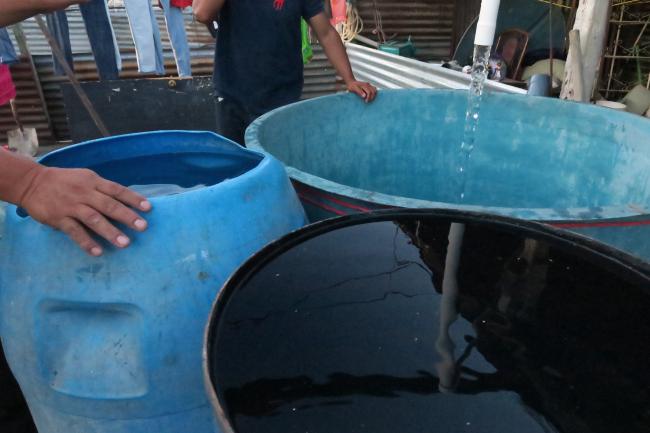
Urban Hydrocracy
Water is a key and common reference in Guatemala’s political campaigns. Despite the abundance of water sources throughout the country known as the land of “eternal spring,” Guatemala’s water access, water quality, and water infrastructure present daily threats to life. Most of the country’s freshwater is heavily contaminated by trash and untreated wastewater, algal blooms, and metals like arsenic. Landslides and floods due to heavy rainfall or leaking drainage pipes swallow homes in both rural and urban regions. So common is the collapse of terrain that a high number of casualties are forecasted every year, a consequence of a failed state unwilling to offer stable landholdings to Guatemala’s majority of landless poor.
Perhaps more deliberate are the deaths provoked by illicit contracts made between the state and international companies for mineral mining and hydroelectric dams. Often without consultation, these megaprojects invade Indigenous and campesino lands under the pretense of rural development. Waterways are redirected and heavily polluted, and if toxic waterways do not asphyxiate communities from their land to make way for industrial accumulation, armed forces often aggressively evict communities. For Indigenous leaders, student researchers, and environmental activists who concern themselves with national water politics, incarceration, disappearance, and death are constant threats. This violent criminalization recalls the collective horrors and uncertainties of military counterinsurgency tactics deployed at the genocidal height of the 1960-1996 civil war in the early 1980s.
Water distribution in Guatemala City remains insufficient and highly unjust. That the municipality lacks the institutional capacity to properly document, manage, and direct public goods and services like potable, rain, and grey waters is one of the few topics in which Guatemala City’s residents have reached consensus. More than 90 wells managed by the municipal water company EMPAGUA support about 70 percent of the entity’s urban water supply to the city, but countless private and mechanic wells dot the 16 microbasins that encompass Guatemala City and its greater metropolitan area; currently, there are no restrictions on private water extraction at the municipal or national levels. Still, in 2010, 11 percent of Guatemala’s urban population lived without access to running water and 25 percent without access to sewage infrastructure.
While the under-regulation of well water has served as a short-term solution to water shortages, it has often aggravated water tensions in working class neighborhoods where residents are beholden to water prices set by homeowner’s associations that have opened private wells. In other low-income and impoverished zones, residents receive water for only two or three hours a day, often at unpredictable hours, or they do not receive water at all. In other cases, water is transferred from municipally owned wells in poorer zones to wealthier areas under the pretense that payment is guaranteed in wealthier neighborhoods. In some cases, residents have received water bills in the tens of thousands of quetzales, an exorbitant cost that corresponds to highly unrealistic quantities of water for any one household. EMPAGUA, which insists on payment, has canceled services to several communities across the metropolitan area. Outspoken community leaders who publicize EMPAGUA’s shortcomings, wrongdoings, or conspiracies face threats and persecution.
In Colonia Nimajuyú—one of the most recognized areas living without potable water and a potent site of community organizing against water shortages—the president of the neighborhood association, Mónica Pereira, was charged by EMPAGUA in January with seven criminal complaints related to a collective action that occured when Pereira was not even in the community. “If you ask me for my opinion, this is not a coincidence,” said the journalist and anthropologist Pia Flores, adding that Pereira was targeted by EMPAGUA to silence the community’s resistance. “EMPAGUA needs to control and use [Colonia Nimajuyú] as an emblematic case to say, ‘this is what happens if you organize.’”
Nonetheless, protests continue in Colonia Nimajuyú against frequent water shortages, with residents being charged monthly for a service they can rarely rely upon. On May 22, community members in the colonia protested a campaign visit by Mayor Quiñónez Lemus.
Flores is the lead writer for the project Hidrocrácia, a participatory journalism project from the independent Guatemalan media outlet Quorum that documents the breadth and intensity of Guatemala City’s water crisis. Using data maps, residential surveys, focus groups, and a “Guide to defend your right to drinking water,” Hidrocrácia comes at an especially critical moment for Guatemala City’s administrative future, questioning who has the right to water and pressuring candidates to attend to this obvious breach of responsibility.
Infrastructural Collapse
As the rainy season begins, concerns about flooding, infrastructural collapse, and contamination increase. One of FoppaXLaCiudad’s primary promises is to restructure EMPAGUA, naming some of the most marginalized city zones as priorities for water redistribution and calling for the resignation of EMPAGUA’s director. In Guatemala’s punitive political landscape, however, the fight for transparency and accountability can be profoundly dangerous.
In September of 2022, two sinkholes ruptured a highway in Villa Nueva, a densely built municipality of commuting, working-class urban residents that borders Guatemala City. They were caused by slow leakage of overloaded wastewater pipes that had eroded their encasing and the surrounding sediment. Days after, journalists leaked videos taken by EMPAGUA employees that documented several widening caves and cracked sewage pipes, some 10 meters in diameter, that had formed beneath primary city roadways like the Roosevelt Highway. EMPAGUA formally denied claims of administrative neglect. Yet, documents later revealed that only 17 percent (roughly 35 kilometers) of the entire drainage system in Guatemala City had been inspected. Two EMPAGUA workmen without adequate safety gear died during the inspections. Shortly after this information was released, the employee who had filmed the leaked video of the emerging sinkholes was found assassinated in his car. The case is unresolved.
The infrastructural and environmental collapse characteristic of Guatemala City’s inequalities can no longer be seen as separate from the criminalization and disappearance of activists, journalists, and communities who fight injustice perpetrated by the corporate and land-owning elite and gagged state actors. Necessities shared across Guatemala’s urban and rural regions, like water infrastructure and its accessibility, elevate questions of security to more than just local petty crime.
Matute’s increasingly popular candidacy threatens circles of impunity that protect crimes and corruption by the state and municipal authorities.
A practiced and dedicated urbanist, Matute’s increasingly popular candidacy threatens circles of impunity that protect crimes and corruption by the state and municipal authorities. A middle-class ladina woman, Matute could also reach a demographic of center-left constituents who have either abstained from voting, disappointed by the corruption and nepotism associated with the Arzú family, or have been disinvested in the plight of the urban poor. Her candidacy reignites the collective leftist memory of Manuel Colom Argueta, a progressive activist, lawyer, urban planner and Guatemala City’s mayor from 1970-1974. Colom Argueta’s achievements, like designing the region’s first comprehensive urban plan and the installation of EMPAGUA, inspired a generation of likeminded architectural and engineering professionals who connected the development of infrastructure and planning to people’s empowerment and liberation. He was assassinated at the hands of the military state in 1979.
“There is an incredible community in Guatemala, mainly represented by young people, young women, who have exercised their rights and raised their voices, that the municipality has criminalized,” Matute said during the May 25 debate about FoppaXLaCiudad’s plan for EMPAGUA. “It is towards those communities and towards those leaders that we are going to focus our work as a collaborative administration.”

